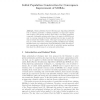118
click to vote
CEC
2010
IEEE
14 years 9 months ago
2010
IEEE
We study the problem of efficiently allocating incoming independent tasks onto the resources of a Grid system. Typically, it is assumed that the estimated time to compute each task...
107
click to vote
BIOSYSTEMS
2007
15 years 2 months ago
2007
This paper proposes and evaluates a multi-objective evolutionary algorithm for survival analysis. One aim of survival analysis is the extraction of models from data that approxima...
116
click to vote
CEC
2010
IEEE
15 years 3 months ago
2010
IEEE
This work focuses on the development of a parallel framework method to improve the effectiveness and the efficiency of the obtained solutions by Multi-objective Evolutionary Algori...
GECCO
2006
Springer
15 years 5 months ago
2006
Springer
The generic Multi-objective Evolutionary Algorithm (MOEA) aims to produce Pareto-front approximations with good convergence and diversity property. To achieve convergence, most mu...
125
click to vote
GECCO
2003
Springer
15 years 7 months ago
2003
Springer
The capability of multi-objective evolutionary algorithms (MOEAs) to handle premature convergence is critically important when applied to real-world problems. Their highly multi-mo...
128
click to vote
GECCO
2004
Springer
15 years 7 months ago
2004
Springer
This paper explores some simple evolutionary strategies for an elitist, steady-state Pareto-based multi-objective evolutionary algorithm. The experimental framework is based on the...
110
click to vote
GECCO
2005
Springer
15 years 7 months ago
2005
Springer
A quality-time analysis of multi-objective evolutionary algorithms (MOEAs) based on schema theorem and building blocks hypothesis is developed. A bicriteria OneMax problem, a hypo...
106
click to vote
EMO
2005
Springer
15 years 7 months ago
2005
Springer
Nearly all Multi-Objective Evolutionary Algorithms (MOEA) rely on random generation of initial population. In large and complex search spaces, this random method often leads to an ...
102
click to vote
CEC
2007
IEEE
15 years 8 months ago
2007
IEEE
— Several multi-objective evolutionary algorithms compare the hypervolumes of different sets of points during their operation, usually for selection or archiving purposes. The ba...
120
click to vote
GECCO
2009
Springer
15 years 8 months ago
2009
Springer
In this paper, we consider multi-objective evolutionary algorithms for the Vertex Cover problem in the context of parameterized complexity. We relate the runtime of our algorithms...


